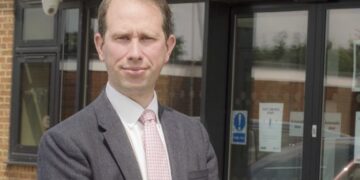THE POLICE and Crime Commissioner has described the government’s recent spending review as “disappoint[ing]” and warned that it risks the effectiveness of policing in the country.
Chancellor Rachel Reeves presented her spending review to Parliament on Wednesday, June 11, which laid out the budgets for different government departments and public services for the next three years.
Among adjustments were an average rise of 3% for the NHS, which would reach a total spend of £226 billion before 2030, and up to £10bn earmarked by 2029 for new technology, including improving the NHS App and delivering single patient records.
The health department would, however, be required to make savings of around £9 billion.
Elsewhere the education budget is set to rise by less than half a percent, though free school meals are to be offered to half a million more children from September next year.
While the government has laid out a rise in the budget for the Ministry of Justice of nearly 2% for day-to-day spending, its investment budget will see a dip of just over 2% in real terms.
The Home Office will see a reduction in day-to-day spending of around 1.7%, while the Ministry of Defence will see a rise from 2.3% to 2.5% of total economic output in the next two years, and a boost of more than 7% in investment spending.
Speaking in the wake of the announcement, Matthew Barber, Police and Crime Commissioner for Thames Valley, said: “I am hugely disappointed by today’s Comprehensive Spending Review–it risks damaging the effectiveness of policing across the country.
“The Treasury has only managed to claim a real terms increase in police funding by comparing their figures to 2023 budgets and ignoring the Consumer Price Index (CPI) measure of inflation. Once the expected police pay rise is taken into account this is likely to be a real terms cut in funding for police forces such as Thames Valley.
“Today’s announcement leaves the Government’s Safer Streets Mission in tatters.”
He explained: “I support the ambition to deliver more neighbourhood police officers – in Thames Valley we had already doubled the number of frontline officers in neighbourhood policing roles before the government came into office.
“Yet it is clear that with cuts to policing budgets and the government’s determination to max out the bill for local council tax payers, there will simply be no way the Government can deliver on their promises.
“The impact on the Ministry of Justice means that we will continue to see problems in our courts and prison for many years to come, heaping more pressure on police forces and risking damage to public confidence.”
He added: “In Thames Valley we have already saved around £20 million in the last two years, with more savings already required–it is time that the Home Office looked at some of the practical ways they can remove costs from the system by reducing bureaucracy and freeing up more resources to fight crime.
“I am extremely concerned about the implications of this funding settlement. In recent years we’ve seen record numbers of police officers, arrests are up and crime is falling.
“This settlement risks putting those achievements into reverse.”




















![The Police and Crime Commissioner has described the government's recent spending review as "disappoint[ing]" and warned that it risks the effectiveness of policing in the country.](https://rdg.today/wp-content/uploads/2025/06/Img1477075.jpg)



